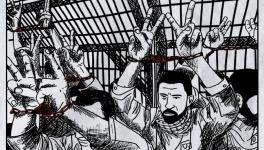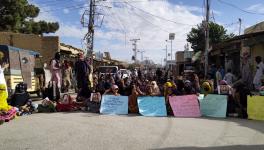EU Lawmakers’ Group Drafts Anti-CAA Motion, Fears ‘Largest Stateless Crisis in the World’
Image for representational use only.Image Courtesy : National Herald
New Delhi: In yet another setback to India’s image abroad amid widespread protests against the new citizenship law and the proposed National Register of Citizens (NRC), the European Parliament is scheduled to consider a motion next week that terms CAA as a law that may lead to the "largest statelessness crisis in the world and cause widespread human suffering”.
The motion, European Parliament resolution on India’s Citizenship (Amendment) Act, 2019, drafted by 154 MPs, is slated to be tabled during the plenary session of Parliament in Brussels next week.
Noting that the CAA “sets a dangerous precedent and represents an intensification of the Government’s Hindu nationalist agenda” the motion underlines that “the indivisibility of human rights, including civil, political, economic, social and cultural rights, is one of the main objectives of the European Union in its relations with India.” It notes that the CAA is, therefore, “explicitly discriminatory in nature as it specifically excludes Muslims from access to the same provisions as other religious groups.”
Listing out various other Indian communities that have been facing persecution in their home countries, the motion points out that Sri Lankan Tamils, who form the largest refugee group in India and have been resident in the country for over 30 years, do not, however, fall under the purview of the CAA.
“Whereas the CAA also excludes Rohingya Muslims from Burma, who have been described by Amnesty International and the United Nations as the world’s most persecuted minority; whereas the CAA also ignores the plight of Ahmadis in Pakistan, Bihari Muslims in Bangladesh and Hazaras in Pakistan, all of whom are subject to persecution in their home countries,” it goes on to add.
According to reports, the 154 European lawmakers who are spearheading the motion, belong to the S&D Group, a progressive forum of MEPs (members of European Parliament) from 26 EU countries.
The motion also cites the Indian Constitution, whose 71st anniversary is being celebrated across India on January 26, and which declares the country as a “sovereign secular democratic republic”, adding that including religion as a criterion for citizenship is “fundamentally unconstitutional.”
The motion also terms the CAA as a law that “undermines India’s commitment to uphold the Universal Declaration of Human Rights, the International Covenant on Civil and Political Rights (ICCPR), and the International Convention on the Elimination of All Forms of Racial Discrimination to which India is a State Party and which prohibit discrimination on racial, ethnic or religious grounds.”
Taking cognizance of the ongoing protests across India, the resolution noted the “27 reported deaths, 175 people being injured and thousands of arrests” as also the use of internet shutdowns, curfews and limits on public transportation to prevent peaceful protests, while making a special mention of police brutalities in Uttar Pradesh.
JNU Violence
The motion against CAA by the European lawmakers also mentions the violence in Jawaharlal Nehru University campus on January 5, “a leading location for students protesting against the CAA and the National Register of Citizens (NRC)”, where students and teachers were attacked by a masked mob.
Terming both the “contents of the CAA and the violence it has encouraged, both from the police and pro-government groups as clear breaches of the human rights of residents of India and its neighbouring countries, the motion calls on the Indian government to ensure that security forces comply with the United Nations Basic Principles on the Use of Force and Firearms by Law Enforcement Officials.
This is significant as many of those killed during the anti-CAA protests, particularly in Bharatiya Janata Party-ruled Uttar Pradesh, reportedly died due to police bullets allegedly fired above the waist. A majority of them have not even received post-mortem reports almost a month after the incidents.
Also Read: Who Were 23 People Killed in UP During Anti-CAA-NRC Protests?
The lawmakers expressed concern that the CAA was fundamentally discriminatory in nature and condemned its adoption. They also regretted the fact that India had incorporated religious criteria into its “naturalisation and refugee policies.”
The powerful group of lawmakers called upon the Indian government to immediately engage in peaceful dialogue with sections of the population and repeal the discriminatory amendments that violate India’s international obligations.
It also reiterated that “peaceful assembly is enshrined in Article 21 of the ICCPR, to which India is a State Party.”
Hoping that the Supreme Court of India, which has received close to 60 petitions on CAA, will “consider carefully the compatibility of the law with India’s Constitution and with international human rights obligations,” the motion said that amendments to the law “constitute a dangerous shift in the way citizenship is determined in India, and are set to create the largest statelessness crisis in the world and cause immense human suffering.”
Get the latest reports & analysis with people's perspective on Protests, movements & deep analytical videos, discussions of the current affairs in your Telegram app. Subscribe to NewsClick's Telegram channel & get Real-Time updates on stories, as they get published on our website.
























